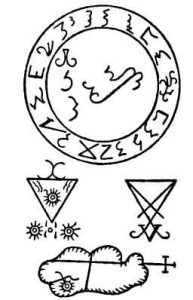 Not so long ago, a virtual daemon dropped a message in my mailbox, announcing the release of a brand new edition of the grimoire called Grimorium Verum. Having heard or read almost nothing about this magical book, I sat down with a cup of chicken blood in order to conduct some e-research on this concise but most sinister manual of black magic. I’m delighted to share with you the wisdom obtained in yet another post on this blog called Grimoires.
Not so long ago, a virtual daemon dropped a message in my mailbox, announcing the release of a brand new edition of the grimoire called Grimorium Verum. Having heard or read almost nothing about this magical book, I sat down with a cup of chicken blood in order to conduct some e-research on this concise but most sinister manual of black magic. I’m delighted to share with you the wisdom obtained in yet another post on this blog called Grimoires.
The Grimorium Verum (or True Grimoire) was allegedly written by Alibeck the Egyptian in Memphis in 1517. It’s agreed that this claim is untrue, as Memphis was nothing more than a ruin by that time. The Grimorium Verum more likely finds it origins in Rome, with the oldest surviving copies in French and Italian, starting from 1817 (see more on dating below). Like many grimoires, it claims to contain the sacred knowledge of biblical figure and legendary demon summoner King Solomon. As such this often overlooked grimoire takes up a place in the so-called Solomonic cycle. The first part of the Grimorium Verum (also spelled Grimoirium Verum) is indeed similar to the Lemegeton, while the second reminds more of the Petit Albert (which was commonly ascribed to Albertus Magnus). In English, the full title of this little treatise reads as follows:
Grimoirium Verum or the Most Approved Keys of Solomon the Hebrew Rabbin where in Most Hidden Secrets both Natural and Supernatural, are immediately exhibited, but it is necessary that the Demons should be contented on their part. Translated from the Hebrew by Palingiere, a Dominican Jesuit, with a Collection of Curious Secrets. Published by Alibeck the Egyptian, 1517.
I dug up another post by Necronomicon expert Dan Harms containing a brief overview of the editorial history of this true grimoire, focussing on early print editions and English translations. I also took the freedom to reproduce those references here, together with some editorial trivia I’ve scraped together. And some nice pictures too, to avoid full accusation of bibliographical theft. Here’s the list, and as said, modern French, Italian, and German editions (all 20th century) are not taken into account. (more…)